Republican Proposal Would Block States From Setting Self-driving Rules

A coterie of Republican officials believe individual states should be forbidden from governing themselves in regard to autonomous vehicles. Only in its commencement, a new U.S. House proposal claims states would not be within their rights to mandate the design or testing of self-driving cars.
If made law, the proposal would eliminate the need for automakers to acquire any pre-market approval from federal regulators. While that sounds like a free-for-all ripe for accountability issues, several states already have laissez-faire or highly supportive attitudes when it comes to autonomous vehicles, though others could become serious headaches for automakers hoping to swiftly get the technology on the road.
The 45-page legislative draft includes 14 bills and would designate the U.S. National Highway Traffic Safety Administration as the primary agency for regulating self-driving cars. It’s aggressively pro-business and, despite being penned by Republicans, has managed to achieve some bipartisan support.
Ohio Congressmen Bob Latta (R), who heads a panel overseeing automobile regulation, called the draft legislation “an important step in establishing a framework to allow innovators to safely develop and test autonomous vehicles.” He said Republicans want “to continue working with all parties in a bipartisan manner as we refine language and move toward a consensus package.”
According to Reuters, that includes a bill allowing the U.S. Transportation Department to exempt up to 100,000 vehicles per year from meeting U.S. federal motor vehicle safety rules. Another would consider all autonomous vehicle testing data, validation reports, and crash information turned over to U.S. regulators to be “confidential business information.”
The vast majority of the proposal mainly serves to aide the industry in development of self-driving cars and protect its interests. Some will likely accuse the proposal of being irresponsible or playing solely into the needs of automakers. However, it would establish a basis of how this burgeoning technology is to handled, eliminating states’ ability to govern themselves in the process. That may seem unfair and, in some ways it is, but a lack of cohesion between rulemakers could leave development efforts dead in the water.
Under the draft, states would still set insurance and registration rules for autonomous vehicles but could not use them as a way to regulate self-driving technologies. California’s department of motor vehicles has fairly strict guidelines regarding the deployment of autonomous vehicles for public operation. It proposed revisions in April, but manufacturers were unsatisfied.
Mitch Bainwol, head of the Alliance of Automobile Manufacturers, spoke to Congress on Wednesday. He called for the elimination of state or local laws that could “unduly burden or restrict the use of self-driving vehicles in the future.”
Assuming the packaged bills become law, it would be a major victory for the Alliance and any tech company trying its hand at autonomous development.
[Image: Ford Motor Company]

A staunch consumer advocate tracking industry trends and regulation. Before joining TTAC, Matt spent a decade working for marketing and research firms based in NYC. Clients included several of the world’s largest automakers, global tire brands, and aftermarket part suppliers. Dissatisfied with the corporate world and resentful of having to wear suits everyday, he pivoted to writing about cars. Since then, that man has become an ardent supporter of the right-to-repair movement, been interviewed on the auto industry by national radio broadcasts, driven more rental cars than anyone ever should, participated in amateur rallying events, and received the requisite minimum training as sanctioned by the SCCA. Handy with a wrench, Matt grew up surrounded by Detroit auto workers and managed to get a pizza delivery job before he was legally eligible. He later found himself driving box trucks through Manhattan, guaranteeing future sympathy for actual truckers. He continues to conduct research pertaining to the automotive sector as an independent contractor and has since moved back to his native Michigan, closer to where the cars are born. A contrarian, Matt claims to prefer understeer — stating that front and all-wheel drive vehicles cater best to his driving style.
More by Matt Posky
Latest Car Reviews
Read moreLatest Product Reviews
Read moreRecent Comments
- Calrson Fan Jeff - Agree with what you said. I think currently an EV pick-up could work in a commercial/fleet application. As someone on this site stated, w/current tech. battery vehicles just do not scale well. EBFlex - No one wanted to hate the Cyber Truck more than me but I can't ignore all the new technology and innovative thinking that went into it. There is a lot I like about it. GM, Ford & Ram should incorporate some it's design cues into their ICE trucks.
- Michael S6 Very confusing if the move is permanent or temporary.
- Jrhurren Worked in Detroit 18 years, live 20 minutes away. Ren Cen is a gem, but a very terrible design inside. I’m surprised GM stuck it out as long as they did there.
- Carson D I thought that this was going to be a comparison of BFGoodrich's different truck tires.
- Tassos Jong-iL North Korea is saving pokemon cards and amibos to buy GM in 10 years, we hope.


































Comments
Join the conversation
I'm not in favor of an unelected board in California determining how much I have to pay for a car, but if the people of California want to have CARB, that's up to them. Likewise, I can see the need for federal standards for autonomous cars related to the FMVSS already in place, but I'm one of those folks who thinks the 50 individual states are laboratories for republican democracy and should have the authority to regulate motor vehicles as each sees fit.
This is a fight between California and the feds or between Silicon Valley and Detroit about who makes the rules and who the rules are supposed to benefit. Auto industry probably feels it stands better chance of getting regulations it likes out of Washington than Sacramento. Or Detroit (and other car companies) think Washington is more likely to favor them over Google, Uber and all the other SV start ups. This has nothing to do with allowing Wyoming to go its own way. Nobody cares about Wyoming.